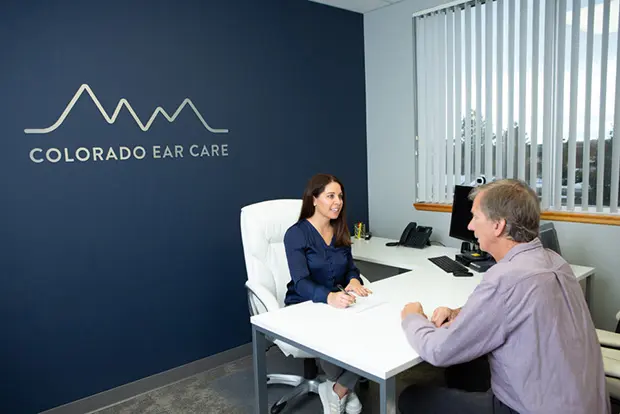Is Meniere’s Disease Genetic? The Truth About Heredity and Genetic Ear Disorders
“Doctor, my mom had Meniere’s—will I get it too?” We break down the real genetic risks and explain why family history isn’t the whole story.
“Doctor, my mom had Meniere’s—will I get it too?” We break down the real genetic risks and explain why family history isn’t the whole story.
Noisy restaurants, crowded events, and group settings can be tough with hearing loss. Learn how to hear better in background noise and get more from your hearing aids.
Noise-cancelling headphones can help protect your hearing—especially in Colorado’s diverse soundscapes. Learn how they work, their benefits, and when professional care is still needed.
Headaches after starting hearing aids? You’re not alone. Learn why it happens, how to fix it, and when to get help—straight from the hearing specialists at Colorado Ear Care.
Learn how to connect hearing aids to phones, TVs, and tablets for clear audio and easier listening.
AI-driven hearing aids go beyond simple amplification, offering real-time sound adjustments, speech enhancement, and even health tracking. Explore how modern hearing technology is transforming lives.
Winter weather can affect both your hearing and hearing aids. Discover how cold temperatures, wind, and moisture impact your ears and devices—and how to protect them.
Modern hearing aids represent a significant investment in your hearing health, with costs typically ranging from $1,000 to $4,500 per ear. Basic digital models typically start around $1,000 with mid-range and premium options ranging from $2,000 to $4,500. For those seeking an affordable alternative, FDA-approved over-the-counter models are available for mild to moderate hearing loss.
Hearing loss can worsen over time due to aging, noise exposure, and health conditions. Learn how to recognize early warning signs and take proactive steps to protect your hearing health.
Discover how to address hearing aid objections, from stigma and cost concerns to technology fears, and support loved ones in improving their hearing health.
Explore the duration, causes, and effective relief strategies for tinnitus. From temporary symptoms to chronic cases, learn how to manage this misunderstood auditory phenomenon.
Category: Hearing Health
Living with diabetes? Discover how it affects your hearing health. Learn the signs of hearing loss, why diabetes increases your risk, and expert strategies for prevention. Protect your hearing today with insights from Colorado Ear Care.
Contact Colorado Ear Care today about your hearing and dizziness/balance questions.

Arvada
7375 W 52nd Ave
Suite 110
Arvada, CO 80002
303-879-2142
Castle Rock
1189 S Perry St
Suite 120
Castle Rock, CO 80104
983-999-2504
Greeley
3400 W 16th St, Bldg 1N
Suite DD
Greeley, CO 80634
970-517-5952
Lakewood
445 Union Blvd
Suite 124
Lakewood, CO 80228
303-963-0085
Louisville/Superior
400 S McCaslin Blvd
Suite 212
Louisville, CO 80027
303-228-3861
¿Hablas español? Llámanos al 720-734-2302. Estamos aquí para ayudarte.